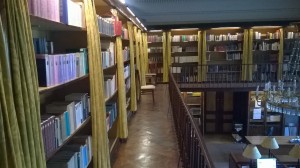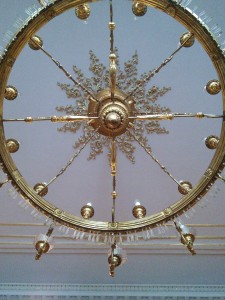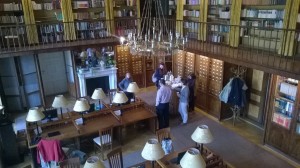A few months ago I visited the Library of the Hungarian Academy of Sciences, looking for primary sources for one of my research projects. When I found nothing I asked one of the librarians whether she could help me. Her only answer was a question about whether I’ve tried Wikipedia yet, “because they usually have very good sources”. As a student my first stop is Wikipedia and as an English Studies major I rarely have a problem finding the relevant piece of information. But those who are looking for Wikipedia articles in their native language of Hungarian have to be content with only 378 000 articles compared to the more than 5 million English language entries.
One of the most surprising gaps in the content of the Hungarian Wikipedia is the lack of Shakespeare related articles. William Shakespeare is one of the most well known writers of all time, with some of the most enthusiastic scholars studying his works all over the world, yet if you are looking for his works on Wikipedia you are going to find only a few entries. And this is exactly what the Hungarian Shakespeare Committee and Wikipedia set out to change.
I had the honour to participate in the second Wikipedia Edit-a-thon, which took place during 13th and 14th of November The event itself was organized by Wikimedia, the Shakespeare Committee and Pázmány Péter Catholic University, and the postgraduate English Studies students of the university had a unique chance to enrich the content of the Hungarian Wikipedia page. Last year several great articles were born and we had quite big shoes to fill.
We all had to write a Shakespeare related article with our groups and also an individual entry on any subject related to English literature or culture. We started our work long before November collecting sources and writing up our articles as a draft. Zita Luca Csathó remembers the weeks before November the following way: “Working on our Wikipedia articles was a challenging task to complete. We built up a time schedule after we had agreed to our deadlines, shared our sources and updated each other on the progress of the project according to the deadlines we chose. The teamwork helped to shape the community, and the responsibility we felt by sharing knowledge with the world made us take seriously our task and keep up a good work together.”
We arrived a little bit early on the morning of 13th November because none of us visited the Petőfi Literary Museum before, and we needed some extra time to find our way. But when we arrived we all had to realize that PLM is one of the most beautiful buildings we had ever seen. After taking a few pictures of the walls, the ceilings and the stairs the event finally started and we were welcomed by the representative of the Wikimedia association, Tünde Hujber, the director of PLM, E. Csorba Csilla and the head of the department of IT, Bánki Zsolt István, and Professor Almási, who choose to talk about Aaron Swartz, the freedom of Internet and knowledge, which seems to be a hot topic in the everyday life of a college student.
and we were welcomed by the representative of the Wikimedia association, Tünde Hujber, the director of PLM, E. Csorba Csilla and the head of the department of IT, Bánki Zsolt István, and Professor Almási, who choose to talk about Aaron Swartz, the freedom of Internet and knowledge, which seems to be a hot topic in the everyday life of a college student.
We soon had to realize that editing Wikipedia is a lot more complicated than it might seem for an outsider. Firstly, all the changes you make to an already existing article have to be approved by a senior editor, even if you are the original author of that article. This meant we had to upload our articles in a perfect state. We have spent all Friday perfecting our own articles and trying to master the magic of Wikipedia-coding and finding out the secrets of the perfect reference. One of the participants, Dorottya Hagyacki, found the references the hardest task to c omplete. “The biggest challenge of uploading my article on Wikipedia – apart from styling it into an aesthetically pleasing work– was definitely the referencing. Being a person who abhors it due to its difficulty, I was quite scared when I comprehended that I had to make several references with the help of Wikipedia’s own code system. However, when our amazing Wikipedia-helper, Tünde, explained and showed its method in details to me, I immediately got relieved. I was slow but steady, and though it took about an hour, I successfully created an official Wikipedia page with correctly formatted and legit references.”
omplete. “The biggest challenge of uploading my article on Wikipedia – apart from styling it into an aesthetically pleasing work– was definitely the referencing. Being a person who abhors it due to its difficulty, I was quite scared when I comprehended that I had to make several references with the help of Wikipedia’s own code system. However, when our amazing Wikipedia-helper, Tünde, explained and showed its method in details to me, I immediately got relieved. I was slow but steady, and though it took about an hour, I successfully created an official Wikipedia page with correctly formatted and legit references.”
By Saturday, we have learned all the techniques of publishing a Wikipedia article and in the one hour left of the editing process, we have all put the Shakespeare articles online – The Taming of the Shrew and The Merchant of Venice – with a minimum amount of frustration. We also realized that we should work a few more years on our articles to make them the best on Wikipedia.
Ágnes Koncz, an enthusiastic postgraduate student whose Wikipedia article is about the German movie The Dark Valley, reflected back on the events of the weekend: “When I was much younger, I remember editing into an already well-compiled Wikipedia article in vigilante-mode. Now I know that it was very rude, having experienced all the work we had to put into our articles. Contributing works that are connected to my studies here at the university made me feel proud and I am ever so positive that these articles will be read and used in the future as frequently as possible. The support from the representative of the Wikipedia crew was immensely helpful; I found the premises utterly stunning.
The second day was shadowed by the events at Paris, at least for me; but it made me realize the importance of using the Internet to fight against the destruction caused by mindless attacks on civilization and protecting the free abundance of information distributed by sites like Wikipedia.”
We  were lucky enough to listen to a lecture by Dr. Alessandra Petrina about Machiavelli’s presence on the British Isles. We did not only get an overview of the early Machiavelli translations but she also shared her newest findings on the subject. After a delicious lunch we said goodbye to each other, knowing we have contributed to the freedom of knowledge.
were lucky enough to listen to a lecture by Dr. Alessandra Petrina about Machiavelli’s presence on the British Isles. We did not only get an overview of the early Machiavelli translations but she also shared her newest findings on the subject. After a delicious lunch we said goodbye to each other, knowing we have contributed to the freedom of knowledge.
Sources of the Images: Hujbert Tünde, Dorottya Hagyacki, Ágnes Koncz


